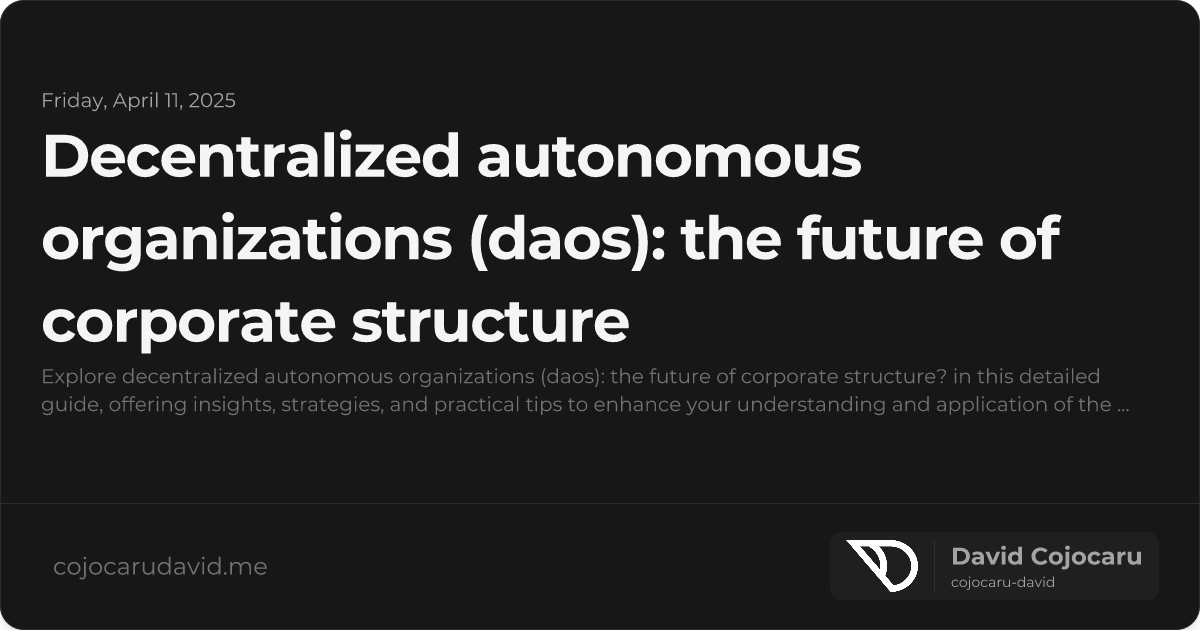Decentralized Autonomous Organizations (DAOs): Reshaping the Future of Business?
The business landscape is evolving, and Decentralized Autonomous Organizations (DAOs) are at the forefront, offering a revolutionary alternative to traditional corporate structures. Harnessing the power of blockchain technology, DAOs empower decentralized decision-making, foster transparent governance, and enable community-driven operations. Are DAOs poised to replace conventional corporations? This post dives into their potential, explores the challenges they face, and considers what the future might hold.
Understanding DAOs: A New Paradigm
A Decentralized Autonomous Organization (DAO) is essentially an internet-native entity governed by rules encoded in smart contracts and operated by its community members, rather than a central authority. Its defining characteristics include:
- Decentralized Governance: Decisions are made collectively through token-based voting mechanisms, giving stakeholders a direct voice.
- Unwavering Transparency: All transactions, proposals, and rules are immutably recorded on the blockchain, ensuring complete visibility.
- Autonomous Operations: Smart contracts automate key operational processes, minimizing the need for intermediaries and streamlining workflows.
DAOs fundamentally challenge traditional hierarchies, empowering stakeholders to actively participate in shaping the organization’s direction.
DAOs vs. Traditional Corporations: A Comparative Look
While traditional corporations rely on centralized leadership structures, DAOs distribute power among their token holders. Here’s a side-by-side comparison highlighting key differences:
| Feature | Traditional Corporation | DAO |
|---|---|---|
| Governance | Board of Directors | Token-based Voting |
| Decision-Making | Top-Down | Community-Driven |
| Transparency | Limited | Fully Transparent |
| Legal Structure | Incorporated Entity | Blockchain-Based |
| Operational Control | Centralized Management | Automated via Smart Contracts |
The Compelling Benefits of DAOs
1. Democratized Decision-Making: Empowering the Community
Every member gains a voice in key decisions, reducing reliance on a small group of executives. Proposals are voted on by the community, ensuring decisions align with their collective interests and fostering a sense of ownership.
2. Streamlined Operations and Reduced Costs
By automating processes through smart contracts, DAOs significantly minimize administrative overhead, leading to reduced operational costs and increased efficiency.
3. Global Participation: Inclusive and Accessible Governance
Anyone with an internet connection can participate in a DAO, regardless of their location. This fosters diverse and inclusive governance, bringing together talent and perspectives from around the world.
Navigating the Challenges Facing DAOs
Despite their immense potential, DAOs must overcome several hurdles to achieve widespread adoption:
- Regulatory Uncertainty: Many jurisdictions lack clear legal frameworks specifically designed for DAOs, creating ambiguity and potential legal risks.
- Security Vulnerabilities: Smart contract vulnerabilities can be exploited by malicious actors, leading to significant financial losses (as demonstrated by “The DAO” hack). Rigorous auditing and security best practices are crucial.
- Scalability Limitations: On-chain voting mechanisms can become inefficient as membership grows, potentially hindering decision-making speed and responsiveness.
DAOs in Action: Real-World Examples
Several successful DAOs are already demonstrating the transformative potential of this model:
- MakerDAO: Governs the DAI stablecoin through a decentralized voting system, ensuring its stability and peg to the US dollar.
- Uniswap: A leading decentralized exchange (DEX) where token holders play a key role in shaping protocol upgrades and future development.
- Aragon: Provides a comprehensive suite of tools and infrastructure for creating and managing DAOs, empowering individuals and organizations to build their own decentralized communities.
Charting the Future of Corporate Structure
DAOs have the potential to fundamentally redefine how businesses are organized and operated. However, widespread adoption hinges on:
- Clear Regulatory Frameworks: Governments must provide clear and consistent legal guidance to foster innovation and mitigate risks.
- Scalability Solutions: Innovative scaling solutions, such as Layer 2 networks, are needed to improve the efficiency of on-chain governance processes.
- Enhanced Security Measures: Robust security audits, formal verification, and bug bounty programs are essential to prevent exploits and ensure the integrity of smart contracts.
As blockchain technology continues to mature, DAOs are poised to become a mainstream alternative to traditional corporations, offering a more transparent, equitable, and efficient model for collaboration and value creation.
Conclusion: Embracing the DAO Revolution
Decentralized Autonomous Organizations (DAOs) offer a compelling vision for the future of organizational governance – a future characterized by transparency, inclusivity, and automation. While challenges remain, their potential to disrupt traditional corporate structures and empower communities is undeniable. The journey towards widespread DAO adoption is underway, and the opportunities are vast.

